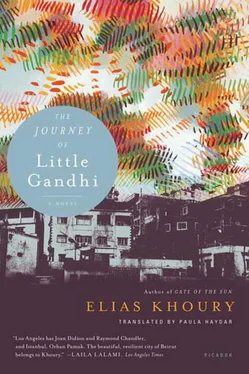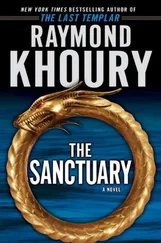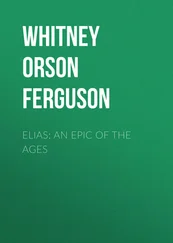“You’re a liar. What do you want from me? Get up, my son. You’re like my son. I can’t anymore. Next thing you know you’ll become senile like the Reverend, and I’ll have to take care of you, and I can’t anymore. But you’re a young man. Honestly, my son, who are you, from what family?”
I told her I had nothing to do with the whole story, that I just wanted to listen, that Simaan Fayyad was our neighbor on “Little Mountain” and I’d known him for a long time. I knew him as a middle-aged man living with his sister in a small house in the Shalfoon area. I didn’t realize he was the grandson of Fayyad Fayyad, the one who met with the czar’s brother and covered the ground with salt and candles.
“You’re a liar. Why are you lying to me?”
I stopped talking and so did she. She poured herself a glass of arak, didn’t mix it with water, and slugged it down in one gulp.
“What do you do for a living?”
“I write. I work as a writer.”
“What the hell is writing for, for God’s sake?”
“To compose books and create heroes, so people can read them and enjoy them.”
“Why don’t they just watch TV? Wouldn’t that be better?”
“Maybe. How should I know,” I said to her to bring the subject to an end.
She looked up at the ceiling as if she were trying to remember something. Then she looked at me.
“I know a writer. We were working for Shaheen. Do you remember Shaheen? Of course you don’t, you still hadn’t broken out of the shell yet. There was a guy there who’d come every night. They said he was a writer, that he was like Gibran Kahlil Gibran. He was stuck on that blond German woman who socked him for his spirit and his money. God, she was a whore, how can anyone do that to a man she’s in love with? But she was a whore. What can I tell you? He’d come every day, sit down, and wouldn’t move for anything. And every night he’d bring her to his table and open a bottle. He was fat, with a face as white as a corpse. At the end of the night it’d turn out he didn’t have any money. He’d take a beating and sit out on the sidewalk and throw up. They said he was a writer. Writer, my foot. I hope you’re not like him.”
“I am like him,” I answered her.
“No, my son. You come from a good family. But what do you want with me?”
“I want to write about you.”
“You’re a liar, like Zaylaa. Nothing you say is true, you’re full of lies. Honestly, what do you want with me? What can I help you with?”
“I want you to tell me stories.”
“Why should I?”
“So I can write.”
“Okay. Instead of telling you, why don’t I just write them?”
She laughed out loud.
“My son, get up. Get out of here. Go, get out of here, say hello to your mother for me. It better not’ve been Zaylaa who sent you. He wants to get rid of me. The son of a bitch said he doesn’t want me to sell flowers inside the Montana anymore. He says I’m bothering the customers. What kind of customers are they? Products of test tubes. See what’s happened? But there’s nothing wrong with working for a living.”
“You’re right,” I said to her.
“What do you mean, I’m right? It’s as if you didn’t understand a thing, like a deaf man at a wedding. My son, that’s not the story. What’s confusing me is why he’s still around. They all died, or left, the ships were filled to capacity with people, but he’s still around. Gandhi died, and he’s still here. He killed his sister and maybe his mother. He became a ringleader, a big boss. The Jews came, and he’s still here. Can you explain that to me? And now he wants to put me out of work, and I’ll die and he’ll still be around. Can you explain it to me? But you, what do you know. What did you say you do for a living, my son?”
She laid down on her bed, closed her eyes, and fell asleep. I got up to leave the room. She was lying on her left side, her legs curled up to her chest in a ball.
I stood there hesitantly, taken by a strong desire to shake her, to grab a hold of her and shake her. I approached her and she opened her eyes halfway and smiled.
“You’re like my son. I’ll get up in a minute. Let me rest for five minutes and then I’ll get up.”
I left her there and went. That was the last time I met with her, for four days later things exploded in Beirut. The uprising of February 6 took place, the Marines fled, and the war broke out again. The area where the Salonica Hotel was became a war zone, and Alice was lost.
When the bombing quieted in March of 1984, I went to the hotel and didn’t find anyone. I found a huge barricade in front of the hotel and a group of armed men. I didn’t dare ask them about the hotel owner or Alice. I went back home and I lost her. I decided to go to the nursing home to look for the Reverend Amin, perhaps he’d know something, or maybe I’d find her there, spending her last days in his company.
When Alice told me, she took me on a journey deep inside a black cave. “Memories are degrading,” she said to me. Memories are a cave, I discovered while I was with her during those long years that her body shortened and changed into disconnected moments. Now, when I try to tell the story, I find that words are no longer signs that point the way but instead make me get lost, as if every word were tantamount to an assassination. How can I tell the story of a life never lived by its characters, a life that passed by them, like an act of will that pierced through them? That’s how Alice and Gandhi lived; even Zaylaa was nothing more than a conduit for this act that pierces the body and changes it into masses of scattered cells.
I tell about Alice because I try to recall her to my memory, and so discover that memories are not degrading but rather a collection of illusions that can’t be tied together, a chain that broke to pieces and sank to the bottom of the sea.
And Alice didn’t cry anymore.
She cried only once. Then the tears that rolled from her eyes ceased to resemble crying. The tears became tears, while the weeping that shook her whole being, like a tree shaking in the wind, that weeping was gone when Abu Jamil cut the silver bracelet she brought with her from her father’s house in Shekka. After that incident Alice bought lots of bracelets and sold them. She’d didn’t care how many she bought and sold. Abu Jamil threw the two pieces out the window. He leaned over and picked them up from the floor, he picked up the two halves of the bracelet, threw them out the window, and took Alice to the nightclub. There life began to waste away like some intangible darkness. In the impending breakdown of light and darkness, Alice experienced the kind of love that chills your spine, and life that murders love and turns it into tattered rags. After Lieutenant Tannous al-Zaim left her, she discovered how a woman can get lost, like she did between Mosul and Aleppo. In Mosul, she lived those black nights that made her think of men as black clothes. In the black room Alice forgot the taste of Lieutenant Tannous, she forgot how his face radiated with desire and grief. In that room she felt she was dying, that death would come when it would come, in the image of a dark man, and so she surrendered to him and slept next to him without dreaming. In Aleppo she danced in a nightclub whose name she’s forgotten. There were lots of Armenians there. She sang to them and they cried to the rhythm of her voice. Alice never sang in Beirut. She never did anything. She’d dance one or two numbers a night, but her job was to sit with the customers. In Aleppo she sang. The short nightclub owner who reeked of shish kebab came over and asked her to sing. She sang the popular song “My Love for You, Laura, Has Inflamed My Heart.” A middle-aged man claiming he was from Antakya in the Iskenderun Province accompanied her on the oud. He bent over his oud as if he were about to fall over, and Alice sang, and the people cried. After she returned to Beirut, she started singing “My Love for You, Laura, Has Inflamed My Heart,” but no one cried. Beirut never cried. Beirut was a city of sparkling nights that trotted across the surface of the sea. As she left Shaheen’s, Alice would actually see the night walking on the water. Saint George Hotel was plunged into the sea, the water around it breaking into patches of darkness and light.
Читать дальше












